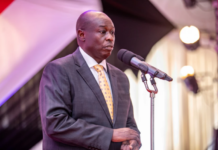The abduction of 25-year-old Billy Mwangi in Embu on Tuesday has sent ripples of concern across Kenya, shining a spotlight on heightened tensions between state authorities and young social media users.
Eyewitnesses reported seeing Mwangi being forcibly taken by four armed, hooded men outside a barbershop at approximately 3:30 pm.
His disappearance follows shortly after he made waves online by sharing viral, AI-generated images depicting President William Ruto in a coffin.
Mwangi’s family has lodged a report with the Embu Police Station. This disturbing incident echoes the earlier abduction of Peter Muteti, whose case was reported at Kabete Police Station.
Both individuals have been linked to controversial posts that have reportedly drawn ire from government officials.
The growing crackdown on dissenting voices on social media has become increasingly pronounced in recent weeks.
Notably, a Twitter user known as @LANDLORD ignited controversy by posting an image of a state funeral procession reminiscent of that of a president.
Mokaya, who faced charges for allegedly publishing false information, even called for President Ruto to appear in court as a complainant—a provocative call that has sparked intense public discourse.
The rise in such incidents reflects a troubling trend in Kenya, where young social media users are increasingly in danger of state retribution.
The Gen Z-led protests against the much-debated Finance Bill 2024 saw numerous youths vanish after posting messages deemed inflammatory.
Critics of the government assert that authorities are treading a precarious line between maintaining national security and infringing on civil liberties. “This is not about justice,” a human rights activist commented. “It’s about silencing dissent.”
Others however, say Gen Z have gone too far, crossing the line between fair comment and outright computer misuse.



















